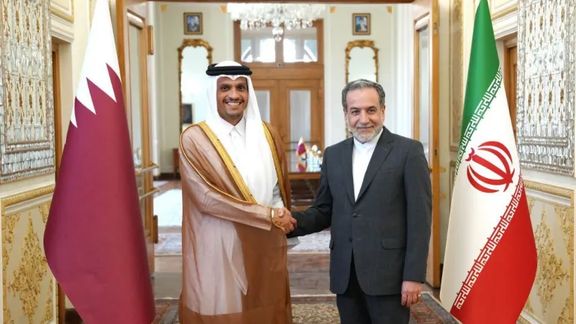The ceasefire talks were halted after Hamas leader Ismail Haniyeh was assassinated in Tehran. Iran vowed to "avenge" his blood but has so far held back, partly because of US pressures and also because it doesn’t want to “jeopardize” ongoing negotiations.
“We will support any agreement that our friends in the Palestinian resistance and Hamas approve”, Iran’s foreign minister Abbas Araghchi told Qatar’s Foreign Minister and Prime Minister Mohammed bin Abdulrahman Al Thani, according to the Iranian Foreign Ministry.
Qatar has been playing a key role in the ceasefire talks and Al Thani has traveled to Tehran to inform the Iranian government of the latest developments and efforts towards a ceasefire deal –led by his country alongside Egypt and the US.
The Qatari prime minister also met Iran’s president Masoud Pezeshkian on Monday, stressing the need to exert diplomatic pressure on Israel and to advance the Palestinian cause. He is the first senior foreign official to visit Iran and meet president Pezeshkian and his top diplomat, Araghchi.
“The two sides affirmed the importance of ending the occupation forces' crimes against Palestinians, the war on the Gaza Strip, and the terrorism practiced by settlers in the West Bank, to spare the region the risks of escalation,” according to a summary of Al Thani’s meeting with Iran’s foreign minister.
Arab countries are most worried that the Iranian-Israeli tensions would lead to an all-out regional war. Iran has so far refrained from its promised retaliatory attack against Israel, while repeating the claim that it has not abandoned the plan to take revenge for the Haniyeh killing.
“Taking revenge for this criminal act, whether by the axis of resistance, or by the Islamic Republic of Iran, is certain,” Major General Mohammad Bagheri said Monday. “Members of the axis of resistance, each based on their capabilities and considerations, will carry out their revenge, some of which we witnessed yesterday,” he added, referring to the attacks on Israel by Hezbollah during the weekend.
Bagheri’s remarks can be read as a sign that Iran could opt out of an attack against Israel from its soil and limit its response to ‘proxy’ operations by Hezbollah and other armed groups in the region. Still, the US is continuing to boost its military presence in the region in anticipation of a major escalation.
On Monday, the Pentagon confirmed that the US thinks the risk of an Iran-led attack against Israel persists. “I would point you to some of the public comments that have been made by Iranian leaders and others,” Pentagon spokesperson Air Force Major General Patrick Ryder told reporters. “We continue to assess that there is a threat of attack.”
Later in the day, White House national security spokesman John Kirby said, "We must assume Iran remains postured and prepared to attack Israel. He described Hezbollah's attack on Israel over the weekend as "sizeable" and said Washington was continuing to maintain a robust force posture in the region.
US Defense Secretary Lloyd Austin has directed two aircraft carrier strike groups to remain in the Middle East, bolstering the US military presence amid Iran-Israel tensions, the Pentagon announced on Sunday.







